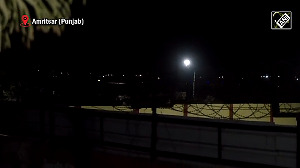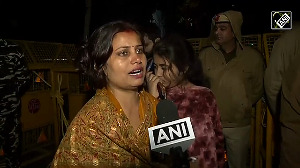The Kashmir conflict has many sides. There are victims and perpetrators on all sides. If the demand for retributive justice is pursued by all sides, it will end up finishing whatever little is left to salvage in Kashmir, feels Sushant K Singh.
It may not have captured the news like Anna Hazare's fast, but the recent discovery of mass graves in the Kashmir valley has been in the news lately. The term 'mass graves' invokes images of Pol Pot or of Rwanda where systemic extermination of a particular ethnic group was carried out by dictators.
It creates an impression that the dead bodies in these graves in Kashmir, presumably in thousands, would be of innocent Kashmiri Muslims killed in cold blood by Indian army soldiers -- with the sanction of the Indian State -- and dumped there.
That is the propaganda. Now for the facts of the case. 2,156 bodies have been found buried in various unmarked graves at 38 places in four districts of Jammu & Kashmir; four districts which have been at the heart of the Pakistan-backed insurgency since 1989. Out of these, 574 dead bodies have been identified to be that of local residents of the state.
The State Human Rights Commission, a statutory body of the Jammu & Kashmir government, has identified these graves. In fact, it is not the final report of the commission but only an inquiry report submitted by the investigation wing of the commission to various parties for filling their rejoinders.
Interestingly, the investigation wing of the commission is manned by members of the Jammu & Kashmir police, a force much maligned for human rights abuses by pro-Pakistan Kashmiri separatists in the valley. Both the state Human Rights Commission and the state police deserve to be commended for displaying the courage to come out with the truth about these unmarked graves.
As an aside, Pakistan, the country Syed Ali Shah Geelani and his gang of separatists want Kashmir to merge with, still does not have a statutory or a constitutional Human Rights Commission.
Kashmir has been ravaged since 1989 by a particularly violent militancy, controlled from across the border by Pakistan. The discovery of 574 bodies of Kashmiris needs to be seen in the context of this violent history of Kashmir conflict where nearly 40,000 lives have been lost so far.
Till April this year, 13,226 civilians and 5,369 security force personnel had been killed in terrorist violence while 21,323 terrorists had been killed by the security forces in the state. Most of the 574 unidentified dead bodies were buried between 1990 and 1996 when the intensity of violence by terrorists was at its peak. Reflecting the trend-line of falling violence in the state, there have been few public reports of burials of unidentified dead bodies in the last seven years.
While every single death is lamentable, let us not forget that 574 is a rather low figure compared to other similarly violent militancies the world over. Even among these 574 bodies, there would be bodies of some local terrorists who couldn't be identified and were thus buried in these graves. The rest of the 1,582 bodies are, in all likelihood, of Pakistani and other foreign terrorists who were sent to spread terror in Kashmir.
If one were to put it bluntly, the story of unmarked graves is being exploited by certain vested interests in Kashmir to whip-up anti-India emotions -- both locally and internationally -- by hyping a few individual tales, obfuscating the facts and coalescing them with dubious data provided by bodies like the Amnesty International. It almost seems to be a selective call for revenge, cleverly disguised as a demand for justice.
Does this mean that these Kashmiris -- 570 or 5700, whatever their number is -- not deserve justice? Yes, they do deserve justice. But it has to be restorative or reparative justice and not retributive justice.
The Kashmir conflict has many sides. There are victims and perpetrators on all sides. If the demand for retributive justice is pursued by all sides, it will end up finishing whatever little is left to salvage in Kashmir. No side will come out of it unscathed. The social and political consequences of such an action will be devastating for the Kashmiris.
If we refuse to face the consequences of false beliefs, we are destined to repeat the mistakes of the past. Is it worth opening old wounds, disturbing the fragile peace by 'counting the bones' and dealing with the past instead of with the future?
No one can claim that Indian security forces haven't made mistakes in Kashmir which resulted in human rights violations. They certainly have. And many of the culprits have been severely punished by the court. But none of these incidents were part of a sinister design of the Government of India to target the Kashmiris solely because of their ethnicity and religion.
Unfortunately, it is the way security forces conduct counter-insurgency and counter-terrorist operations in India. They have been no different while dealing with terrorism in Punjab or the Northeast, or while conducting anti-Maoist operations in the Indian heartland. Misleading portrayal of Kashmiri Muslims as victims of Indian State's pogrom will deflect the attention away from this critical weakness of counter-insurgency operations in India.
Although Jammu & Kashmir Chief Minister Omar Abdullah has suggested a Truth and Reconciliation Commission to achieve closure, the proposal is unlikely to see the light of the day due to a lack of political consensus. Reconciliation is a legitimate long-term vision, but building capable institutions to deal with past injustices and peaceful co-existence -- not reconciliation -- should be the first aim.
In the short term and at the operative level, it is mainstream politics that must demonstrate positive determination by taking ownership of the issue. The executive policies should ensure the construction of ossuaries, museums, monuments and other memorials so that those dead -- on all sides -- can be buried with dignity.
Legal institutions have an important role to play at this stage, as they have the potential to transform violent conflict into arbitrated settlements. They can move forward on the question of Kashmiris deemed to have disappeared over the years, while taking into account the large number of Kashmiris who crossed over into Pakistan and continue to live there.
The judicial system must also act with alacrity on high-profile false-encounter cases -- where security forces seem prima facie guilty -- like Pathribal and Machil, determine the nature of those crimes, and decide on the way of repairing the wrongs.
This reconciliatory approach must also be accompanied by other initiatives: A land and housing commission to restore the property rights of original owners, reparations to the victims of the conflict, and grassroot reconciliation work by community organisations. The road ahead is not easy but the endeavour has to be to move on the path of respectable closure.
Sushant K Singh is a Fellow for National Security at the Takshashila Institution and editor of Pragati - The Indian National Interest Review.








 © 2025
© 2025